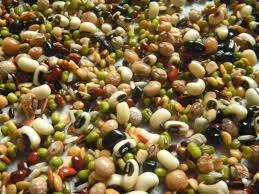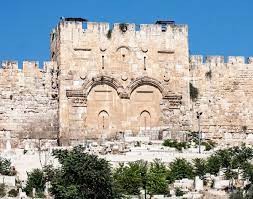Beans – Vegetables

Beans Introduction:
A common product of Israel used as a valuable and very ancient piece in the Israelite diet. The Bible references are probably to the Faba vulgaris (N.D. Leguminosae) or horsebean. This is sown in the autumn; is in full flower–filling the air with sweet perfume–in the early spring; and is harvested just after the barley and wheat. The bundles of black bean stalks, plucked up by the roots and piled up beside the newly winnowed barley, form a characteristic feature on many village threshing-floors. Beans are threshed and winnowed like the cereals. Beans are eaten entire, with the pod, in the unripe state, but to a greater extent the hard beans are cooked with oil and meat. (Orr, 1915).
The beans are large, coarse seeds. Sometimes the Israelites mixed these beans with other grain for bread. This recipe is for something that bible scholars refer to “Ezekiel’s bread,” which the prophet told the people to prepare during the seize of Jerusalem It is one of the few specific recipes found in the bible. (Ezekiel 4:9). Generally, these beans were eaten by the poorer classes of people. Kidney beans and horse beans are grown in Syria. (MacKay, 1950). David receives from certain faithful friends of his at Mahanaim a present, which included “beans, and lentils, and parched pulse. (2 Samuel 17:28).
The history of the leguminous plants is historically among the place of honor. There were some attempts have been made to use it for bread. Bean meal is known as “lomentum.” When mixed with flour it adds to the weight of the bread. Beans were used for numerous purposes, and are used for feeding cattle, and man. They are mixed with wheat. Bean pottage reside in ancient ceremonials, and holds its place in the religious services of the gods. Beans are mostly eaten together with other food, but it is generally thought that they dull the senses, and cause sleepless nights attended with dreams. Hence it is that the bean has been condemned by Pythagoras. Pythagoras of Samos was an Ionian Greek philosopher, mathematician, and founder of the religious movement called Pythagoreanism. (Pliny the Elder. 1855 p. 4043).
Reference:
MacKay, Alastair. (1950, December). Farming and Gardening in the Bible. Emmaus, Penna; Rodale Press
Orr, James. (1915). “Definition for ‘BEANS'”. “International Standard Bible Encyclopedia
Pliny the Elder. (1855). The Natural History, ed. John Bostock. Medford, MA: Taylor and Francis, Red Lion Court, Fleet Street.
Cite Article Source
MLA Style Citation:
Holstein, Joanne “Beans: Vegetables:.” Becker Bible Studies Library Feb 2015.< https://guidedbiblestudies.com/?p=2332,>.
APA Style Citation:
Holstein, Joanne (2015, February) “Beans: Vegetables:.” Becker Bible Studies Library. Retrieved from https://guidedbiblestudies.com/?p=2332,.
Chicago Style Citation:
Holstein, Joanne (2015) “Beans: Vegetables:.” Becker Bible Studies Library (February), https://guidedbiblestudies.com/?p=2332, (accessed).

